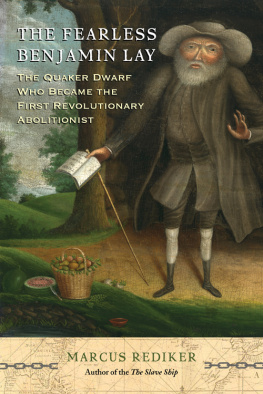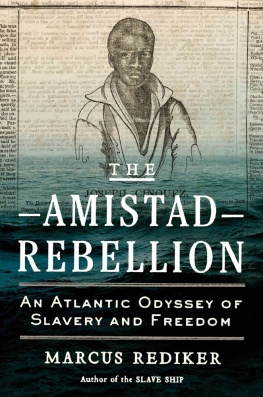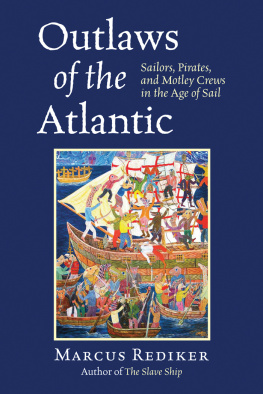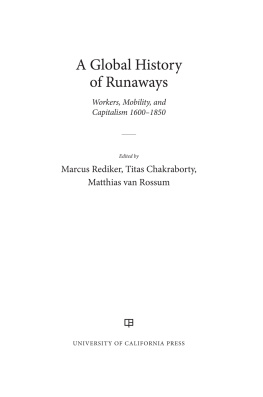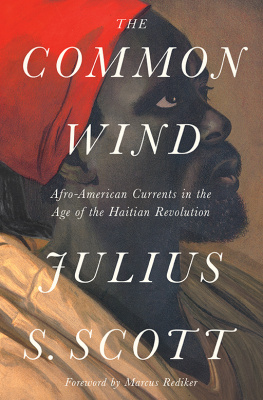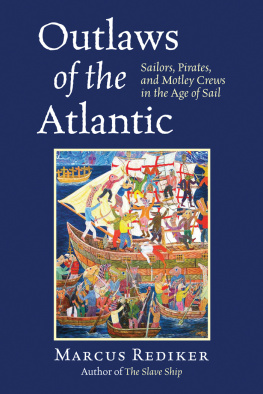ALSO BY MARCUS REDIKER
Outlaws of the Atlantic: Sailors, Pirates, and Motley Crews in the Age of Sail
The Amistad Rebellion: An Atlantic Odyssey of Slavery and Freedom
The Slave Ship: A Human History
Villains of All Nations: Atlantic Pirates in the Golden Age
The Many-Headed Hydra: Sailors, Slaves, Commoners, and the Hidden History of the Revolutionary Atlantic (with Peter Linebaugh)
Between the Devil and the Deep Blue Sea: Merchant Seamen, Pirates and the Anglo-American Maritime World, 17001750

To my children
Eva, Ezekiel, and Greer
with hope that you
and your generation
will take inspiration
from this life story


INTRODUCTION
PROPHET AGAINST SLAVERY
ON SEPTEMBER 19, 1738, Benjamin Lay strode into a large gathering of Quakers in the Burlington, New Jersey, meetinghouse for the biggest event of the Philadelphia Yearly Meeting. Benjamin had journeyed almost thirty miles on foot, as was his way, arriving four days earlier and subsisting on Acorns & peaches only. Presiding over the gathering were John Kinsey, clerk of the Philadelphia Yearly Meeting, and Israel Pemberton Sr., assistant clerk, leaders of the Society of Friends in the Philadelphia region and the Quaker-dominated legislature of Pennsylvania. Benjamin had a message for them and indeed for all of the assembled.
Benjamin surveyed the room and took a conspicuous location. He wore a great coat, which hid a military uniform and a sword from his fellow Quakers, who, back in 1660, had embraced the peace testimony, refusing all weapons and warfare. Beneath his coat Benjamin carried a hollowed-out book with a secret compartment, into which he had tucked a tied-off animal bladder filled with bright red pokeberry juice. Because Quakers had no formal minister nor church ceremony, people spoke as the spirit moved them. Benjamin, a man of spirit pure and unruly, waited his turn.
He finally rose to address this gathering of weighty Quakers, many of whom owned African slaves. Quakers in Pennsylvania and New Jersey had grown rich on Atlantic commerce and many bought human property. To them Benjamin delivered a chilling prophecy. He announced in a booming voice that God Almighty respects all peoples equally, rich and poor, men and women, white people and black alike. He explained that slave keeping was the greatest sin in the world and asked, How can a people who profess the Golden Rule keep slaves? He then threw off his great coat, revealing the military garb, the blade, and the book to his astonished co-religionists. A collective murmur filled the hall. In a rising crescendo of emotion, the prophet thundered his judgment: Thus shall God shed the blood of those persons who enslave their fellow creatures. He pulled out the sword, raised the book above his head, and plunged the sword through it. The people in the room gasped as the red liquid gushed down his arm; several women swooned at the sight. To the shock of all, he spattered blood on the heads and bodies of the slave keepers. Benjamin prophesied a dark, violent future: Quakers who failed to heed the prophets call must expect physical, moral, and spiritual death.
The room exploded into chaos, but Benjamin stood quiet and still, like a statue, remarked Kinsey. Several Quakers quickly surrounded the armed soldier of God, picked him up, and carried him from the building. Benjamin did not resist. But he had made his point. As long as Quakers owned slaves, there would be no business as usual if Benjamin could help it. His brothers and sisters had made peace with the devil, so he used his body to disrupt their hypocritical, pious routines.
This spectacular prophetic performance was one moment of guerrilla theater among many. Benjamin repeatedly dramatized what was wrong in both the Society of Friends and the world at large. For a quarter century he railed against slavery in one Quaker meeting after another, in and around Philadelphia, confronting slave owners and slave traders with a savage, most un-Quaker-like fury. Whenever he performed guerrilla theater, his fellow Quakers removed him by physical force as a trouble-maker or disorderly person as they had done in Burlington. He did not struggle against eviction, but back he came, again and again, undeterred, or rather more determined than ever. He began to stage his theater of apocalyptic outrage in public venues, including city streets and markets. He refused to be cowed by the rich and powerful as he freely spoke his mind. He practiced what the ancient Greeks called parrhesiafree, fearless speech, which required courage in the face of danger. He insisted on the utter depravity and sinfulness of Man-stealers, who were, in his view, the literal spawn of Satan. He considered it his Godly duty to expose and drive them out. His confrontational methods made people talk: about him, his ideas, the nature of Quakerism and Christianity, and, most of all, slavery. His first biographer, Benjamin Rushphysician, reformer, abolitionist, and signer of the Declaration of Independencenoted that there was a time when the name of this celebrated Christian Philosopher... was familiar to every man, woman, and to nearly every child, in Pennsylvania. For or against, everyone told stories about Benjamin Lay.
The zealot carried his activism into print, publishing in 1738 one of the worlds first books to demand the abolition of slavery: All Slave-Keepers That Keep the Innocent in Bondage, Apostates. All enslaved people were innocent, Benjamin believed, so he called for all to be emancipated, immediately and unconditionally, with no compensation to slave owners. Slave keepers had transgressed the core beliefs of Quakerism in particular and Christianity in general: they should be cast out of the church. Benjamin wrote his book at a time when slavery seemed to many people around the world as natural and unchangeable as the sun, the moon, and the stars in the heavens. No one had ever taken such a militant, uncompromising, universal stand against slavery in print or in action. Benjamin demanded freedom now.
Perhaps because he had little education, Benjamin ignored the rules of convention in writing his book. It made for odd reading, then and since, but it is a veritable treasure trove for a historian: a mixture of autobiography; prophetic Biblical polemic against slavery; a commonplace book into which he dropped writings by others as well as his own thoughts on a variety of subjects; haunting, surreal descriptions of slavery in Barbados; an annotated bibliography of what he read; and a vivid, scathing account of his own struggles against slave owners within the Quaker community. It is a founding text of Atlantic antislavery.
Benjamin knew that Kinsey, Pemberton, and the other members of the Quaker Board of Overseerswho vetted all publicationswould never approve the book. Most of them owned slaves. So he went directly to his friend, the printer Benjamin Franklin, and asked him to publish it. When Franklin saw a confused jumble of pages in a box he expressed puzzlement about how to proceed. Lay answered, Print any part thou pleaseth firstassemble the materials in any order you like. As one exasperated reader later noted of the different parts of the book, the head might serve for the tail, and the tail for the body, and the body for the head, either end for the middle, and the middle for either end; nay, if you could turn them inside out, like a glove, they would be no worse for the operation. (Lay was one of the worlds first postmodernists.) Franklin agreed to publish the ringing rant against slavery, knowing full well that the wealthy Quakers assailed in it would howl in protest. He quietly left the printers name off the title page.

